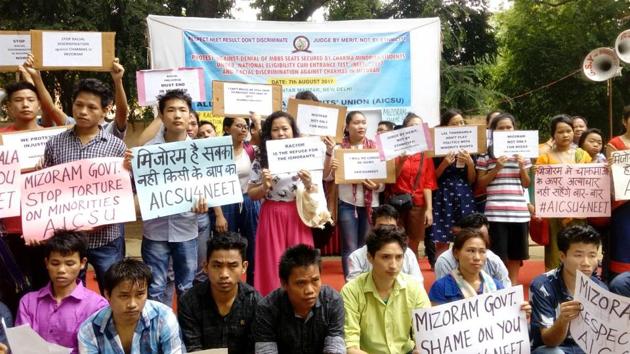Chakma students protest discrimination by Mizoram govt
Four Chakma students lost admission to medical colleges after a student group demanded that ethnic Mizos receive preferential treatment.
During a protest held at Delhi’s Jantar Mantar on Monday, the All India Chakma Students’ Union (AICSU) urged Mizoram chief minister Lal Thanhawla to end “oppression and racial discrimination” against indigenous Chakma minorities in the state.

Thanawla’s office declined to comment.
The allegations stem from July 19, when Darshan Chakma, Nibir Chakma, Mini Chakma and Nibhir Tongchangya were all selected to pursue bachelors’ degrees in medicine and surgery in Indian colleges. Just a day later, the state government invalidated the local counselling session they had attended. Since counselling is necessary for admittance, the students were effectively denied the seats they’d been promised.
They didn’t break any laws or college rules; there was nothing wrong with their applications or test scores. Instead, the only apparent reason their admissions were revoked was a simple, clear, and seemingly irrelevant fact: all the students were ethnically Chakma.
Last month, the Mizo Zirlai Pawl (Mizo Students’ Association, or MZP) demanded that medical seats be allotted to Mizo students only and threatened to launch an indefinite, statewide bandh. Their protests caused the state government to intervene.
“The Mizoram government must encourage merit, not communalism,” said Dilip Kanti Chakma, the president of the AICSU.
The four Chakma students had secured ranks of four, nine, 17 and 23 among Mizoram students who took the NEET, high enough to grant them admission under the centre’s quota for scheduled tribes from Mizoram. Both ethnic Mizos and Chakmas are considred scheduled tribes. Mizos are the majority group in the state.
Based on their rankings, Darshan Chakma was allotted a seat in Guwahati Medical College, Nibir Chakma in Jodhpur’s Dr SN Medical College, Mini Chakma in Burdwan Medical College, and Nibhir Tongchangya in Raipur’s JLNM Medical College.
On July 19, they were called for counselling to the office of the higher and technical education department in the state capital, Aizawl. Members of the MZP members prevented the Chakma students from entering the counselling venue.
The next day, the police escorted the Chakma students and their parents or guardians into the counselling venue amid continuing protests by the MZP. When the agitating students tried to break into the venue, the police fired tear gas and charged at them with canes.
The counselling process, which includes the verification of documents and the payment of fees, was completed on the 20th. The MZP responded by calling an indefinite bandh to start on July 21.
State government officials negotiated with the MZP the evening of the 20th. The Mizo students called off the shutdown after the government “agreed that no Chakma students would be admitted in medical colleges under Mizoram quota”, according to the AICSU.
The conflict about student reservations for Chakmas in Mizoram goes back at least to 2014, when the MZP protested outside the hgher education office in Aizawl saying that the Chakmas, who migrated from Bangladesh in the mid-20th century, are not “indigenous people of Mizoram” and should not get the same treatment as Mizos. In response, the state’s higher and technical education department gave preference in college placements to “Zo-ethnic people who are native inhabitants”.
In June 2015, the Gauhati High Court stayed the new rules in a case brought about by the Mizoram Chakma Students’ Union.
The issue of the denial of seats to the four qualified Chakma students was raised in the Rajya Sabha last month. The Bharatiya Janata Party’s Basawaraj Patil sought the central government’s intervention.
He also raised the issue of 17 Chakma students who left an outlet of Jawahar Navodaya Vidyalaya in Mizoram’s Kolasib district after allegedly being harassed and intimidated by Mizo locals.





